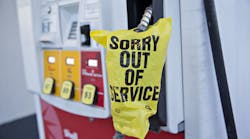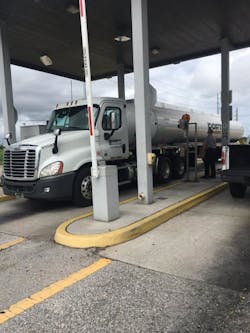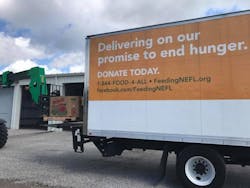Truckers are playing a critical role as Florida and the southeastern United States begin the recovery process from Hurricane Irma.
Utility crews from around the country were converging on Florida to help restore electrical power to the millions of customers who face days - or even weeks - in the dark.
As several ports began to reopen for limited operations, there was a major emphasis on getting trucks hauling fuel loaded to alleviate shortages throughout the region.
Though many roads were damaged or covered in debris, Florida transportation officials said all interstates and turnpikes were open.
A truck enters the Port of Tampa to get a load of fuel. (Photo: Jackie Callaway/Twitter)
About 17,000 people from the state’s highway patrol were working to keep traffic moving. They were also assessing the devastation in some of the hardest hit areas, including the Keys, where some bridges remain shut.
U.S. Rep Mario Diaz-Balart of Florida announced on Twitter the Department of Transportation had already issued $25 million to repair federal-aid highways and roads damaged by the storm.
That was the same amount made available to Texas in the immediate aftermath of Hurricane Harvey. Diaz-Balart is chairman of the subcommittee on Transportation, Housing, and Urban Development Appropriations.
After touring the damage with Sen. Marco Rubio (R) from the air, Sen. Bill Nelson (D) said it was clear another federal emergency disaster relief bill would be needed.
“There will have to be a lot of assistance,” Nelson said.
Prior to Irma, Congress approved a $15 billion relief package for Harvey.
Meanwhile, to help speed the delivery of needed motor fuels and other suppliers throughout the region, the Trump administration extended its waiver of the Jones Act, which normally requires all shipping between U.S. ports be done by American-built and American-crewed vessels.
As of Tuesday afternoon, GasBuddy.com reported that about half of all fueling stations in Miami, Fort Lauderdale, Tampa, and many other large cities were empty. Many counties in Georgia and South Carolina had well more than 10 percent of stations without fuel.
Major ports, including Tampa and Miami, closed over the weekend, preventing tankers loaded with gasoline, diesel, and jet fuel from unloading.
Florida Gov. Rick Scott said several ports have fuel stored in large barges, and that supply was already being pumped into trucks for delivery. That includes Port Everglades, which supplies 100 percent of fuel to stations in Miami-Dade, Broward, Palm Beach and Martin counties.
Other Florida ports were still conducting damage assessments, and said they planned to initially focus on fuel and emergency deliveries once clearance was granted from the U.S. Coast Guard.
To the north in Georgia, the Port of Savannah announced it was planned to resume limited operations by Tuesday night.
Damage from the storm was felt as far as the Ohio Valley region. In response, the Federal Motor Carrier Safety Administration said it was expanding its emergency declaration to cover Arkansas, Illinois, Indiana, Kentucky, Missouri, and Ohio. It already included Florida, Georgia, South Carolina, North Carolina, Tennessee, Alabama, and Mississippi.
Truckers in these states are not be subject to hours-of-service rules, provided they are hauling emergency relief supplies to affected areas.





